Saturday 28th January 2023
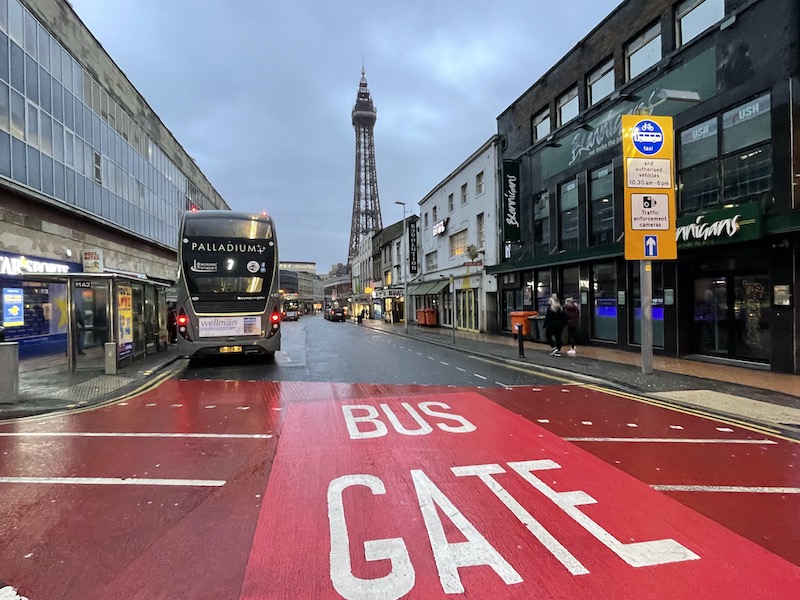
Blackpool Transport’s history can be traced back 138 years to the Town Council’s introduction of trams in September 1885. However, my 2023 fortnightly A-to-Z wander through selected bus and train operators is meant to be a contemporary commentary rather than a history lesson, so let’s fast forward and see what the (one of only eight) municipally owned bus companies is like today.
Blackpool Transport was crowned Bus Operator of the Year in last November’s UK Bus Awards so with much anticipation I paid a visit to the town a couple of weeks ago to seek out what the magic ingredient was that led to this much sought after accolade.
It turned out to be one of those very wet and dismal January days therefore both the town and its buses and trams weren’t seen in the best of light, literally, but I very much enjoyed my visit and could easily imagine how much better it all looks on a warm sunny day.
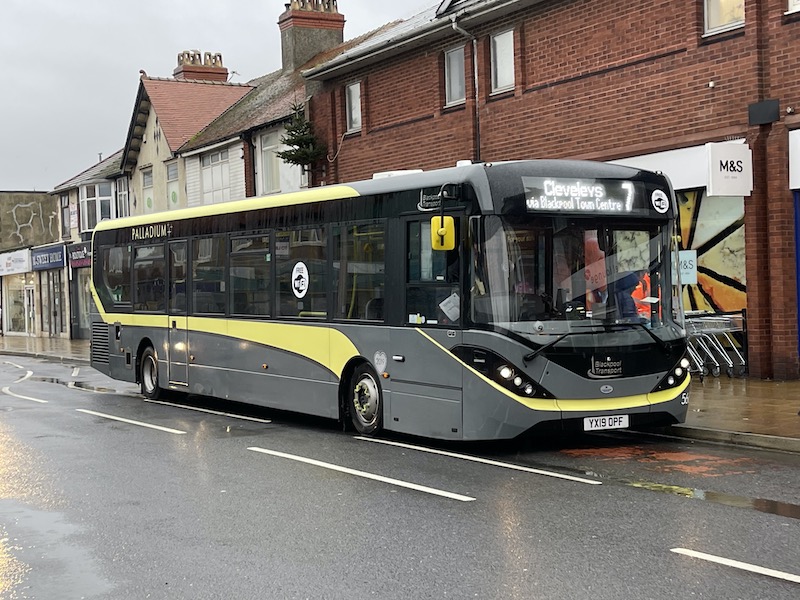
The fleet’s grey livery didn’t help brighten the day either, as it doesn’t come across as very inspiring although I know these things are very much a matter of personal taste and for some, a nice smart grey coloured bus with a pale yellow swirl is just what’s needed for an attractive appearance.
First impressions were very encouraging as I stepped off the train at Blackpool North station. Behold a display of bus timetable leaflets.
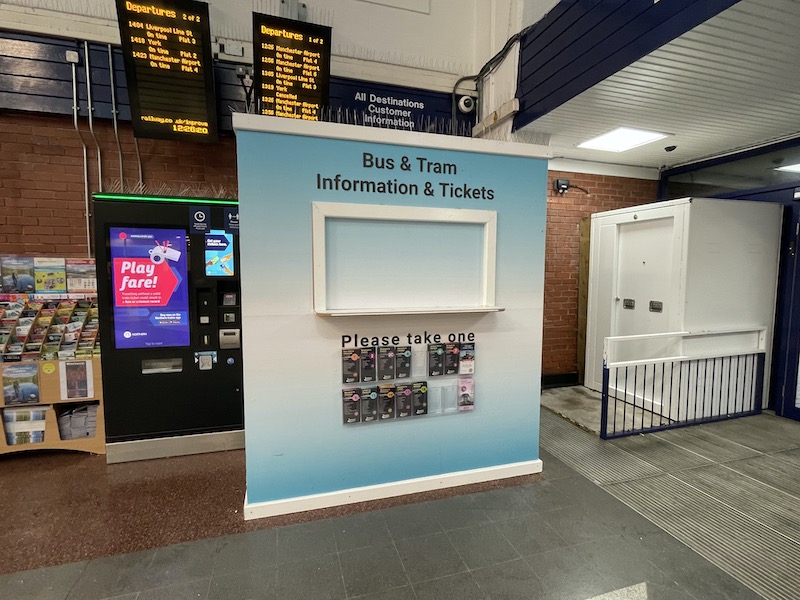
What an excellent start and quite amazing in these “it’s all online so we’re not bothering to print anything any more” times. So well done Blackpool Transport. Sadly it wasn’t a full set with some routes missing, but that’s just a small niggle.

Another encouraging sight was tram tracks now in place ready for the extension from the seafront to the station, because of course, Blackpool Transport also operates trams as well as buses. This spur link to the station has been a long time in the making, and it’s good to see at long last it looks ready for opening by the summer.

I’m sure this will be hugely welcomed by the thousands of visitors who arrive in the resort by train and want to reach hotels on the seafront or the myriad of amusements, souvenir shops, fish and chip outlets and the Pleasure Beach.
It can be a bit confusing working out which bus and from where to catch it to take to reach various destinations. The tram will make it much easier.

I wandered into the town’s retail centre and spotted a directional finger post pointing towards “Bus and Tram Info” which seemed a good place to start my visit …
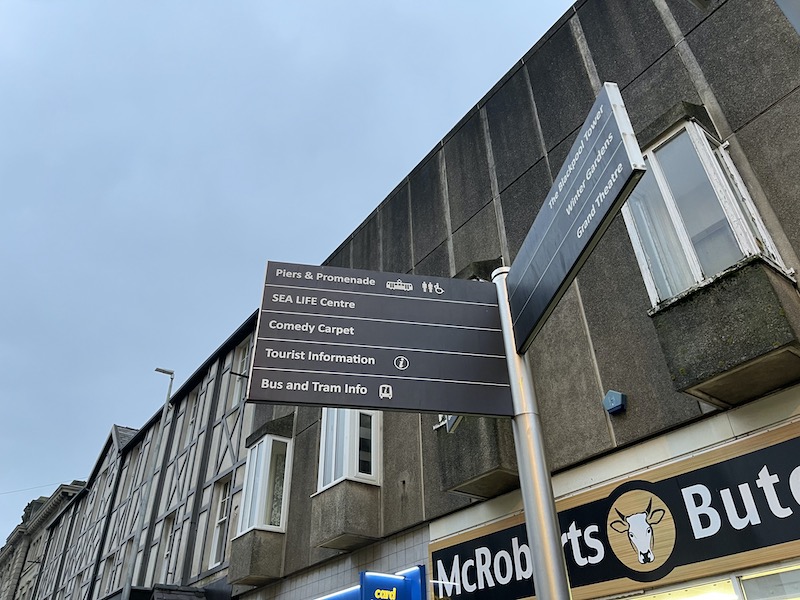
…. and after a false lead to Blackpool Council offices dealing with tenants and other enquiries I found Blackpool Transport’s ‘Customer Centre’ in nearby Market Street.

Except this now looks very much closed to customers with a door on the left leading to facilities for drivers. As you can see there is a screen in the window with information about where to catch a bus in the town centre – which is definitely helpful as bus stops are spread over a few streets – and a display showing upcoming departures to a mix of both real time, and what seemed to be scheduled time.

There was also a scrolling message along the bottom which wasn’t particularly encouraging, but a sign of current times. Although I was a bit surprised to see this as looking a the Company’s social media posts the days of cancelled journeys due to driver shortages seemed to be over, and all the journeys I took ran as scheduled.

Blackpool’s bus fleet is very much an Alexander Dennis stronghold. This follows a deal between the companies made in 2016 for a ‘fleet renewal partnership’ aiming for an average age of less than three years by 2020. You certainly do notice the standardisation this has brought with almost all buses now being either double deck Enviro400s or single deck Enviro200s.

There are still 10 Mercedes Citaros dating from 2015 which won’t be helping that average age target …

… and, unless I missed them, I didn’t spot any buses newer than 2020 on the road, so I wonder if the ‘partnership’ is still a thing for further fleet renewal or whether the tough financial times now characterising the industry has meant a rethink has been necessary. Certainly the influx of vehicles in the four years between 2017 and 2020 have a lot of life left in them yet. I read that the entire fleet is to Euro VI standard too, which is impressive.
Blackpool Council has been successful in its application for £9.6 million grant funding from the DfT’s Zero Emission Bus Regional Awards Scheme which will see electric buses join the fleet as well as the redevelopment of the Rigby Road depot to accommodate them.
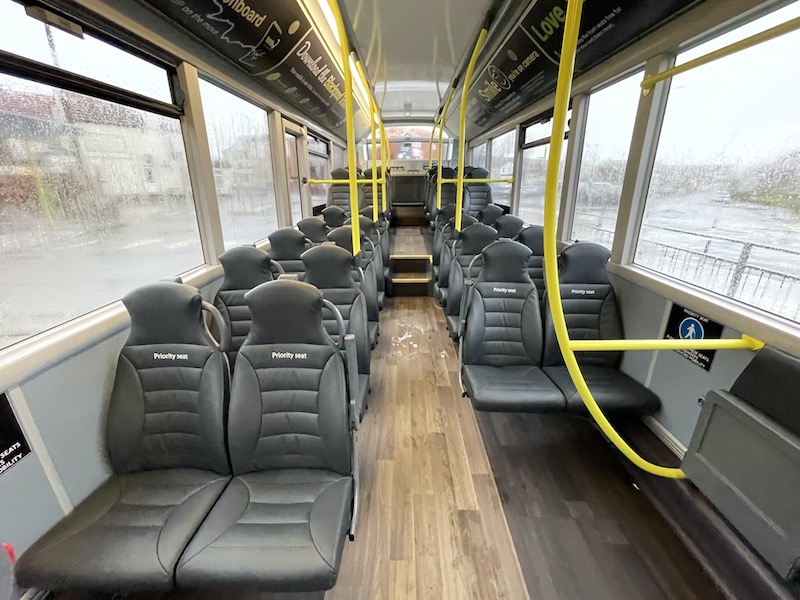
As well as the livery, bus interiors are also grey and look smart with comfortable seats and the yellow stanchions and poles all seems to fit in with the corporate colours as do the messages on the cove panels although I found them to be a bit on the ‘shouty’ side of communication…

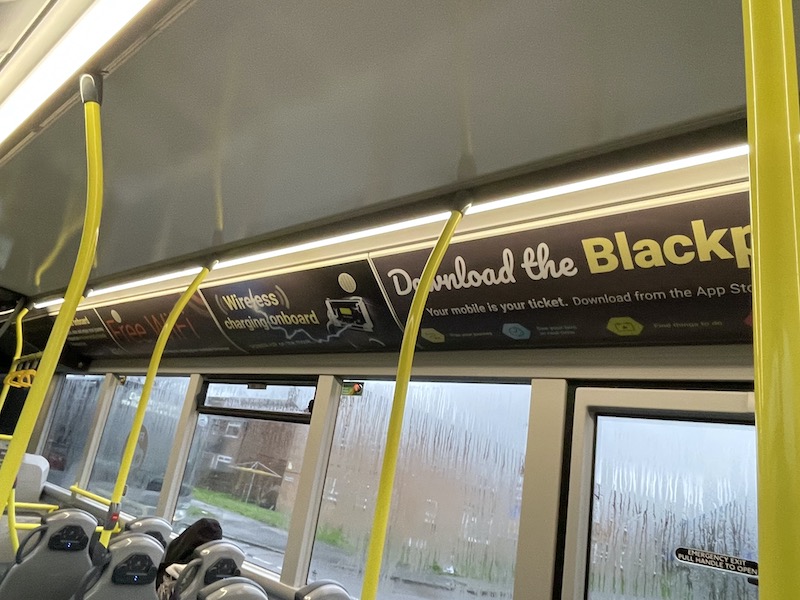
…and sadly vandals seem to have been at work on the seat back mobile phone holders for contactless charging with the prongs to hold them in place snapped off on some buses.
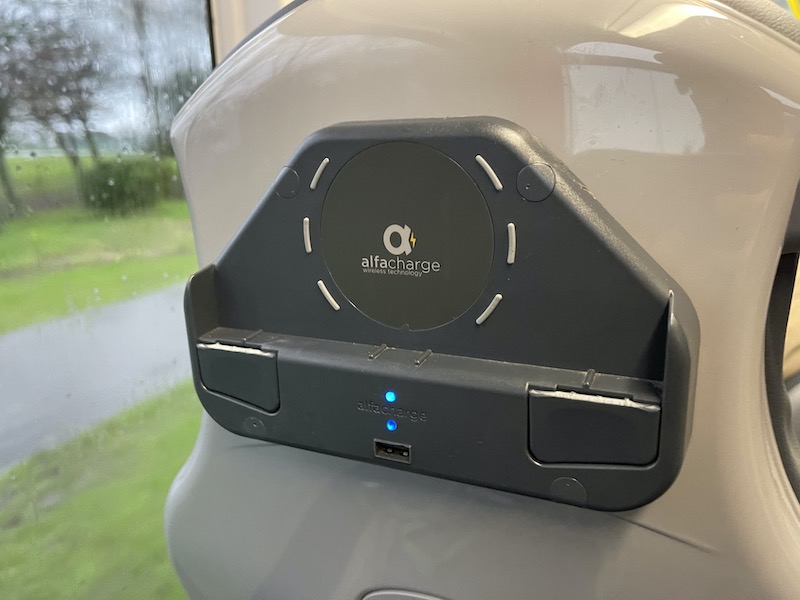

This is a shame, and I recall when usb sockets were introduced on the first Enviro400 buses a few years ago, they were also vandalised leading the Company to announce it was ceasing to install this facility at that time.

Blackpool’s network of routes covers an area from Fleetwood in the north to Lytham in the south as well as Poulton-le-Fylde to the east. Routes 74/75 operate from Fleetwood as far as Preston and curiously in the ‘Route Guide’ (shown above) are listed as running “up to every 7 mins” but it looks to me as though each of the two routes runs hourly.
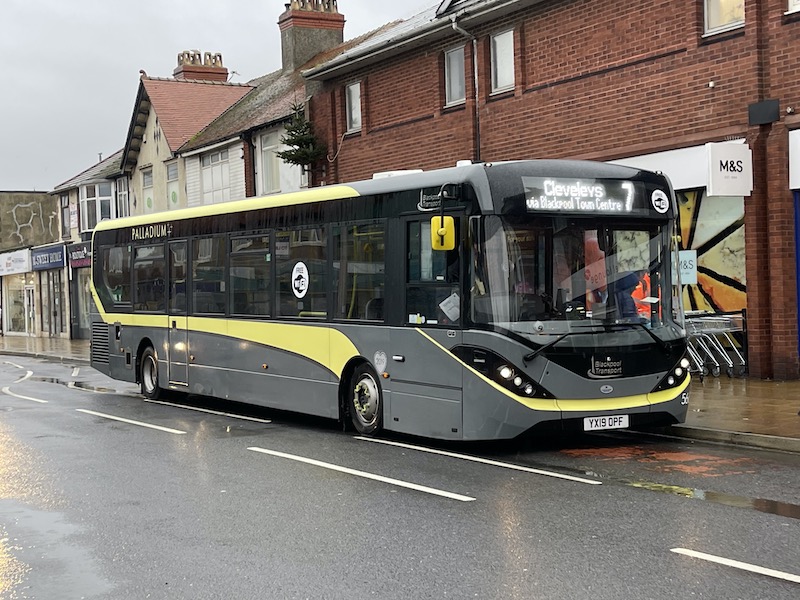
The most frequent town route is the 14 which links Fleetwood with Blackpool via Thornton and Layton every 12 minutes (according to the Route Guide) but aside from an extra departures at 06:49 the timetable is a 15 minute frequency. Other routes are mainly every 20 or 30 minutes with a few at hourly.
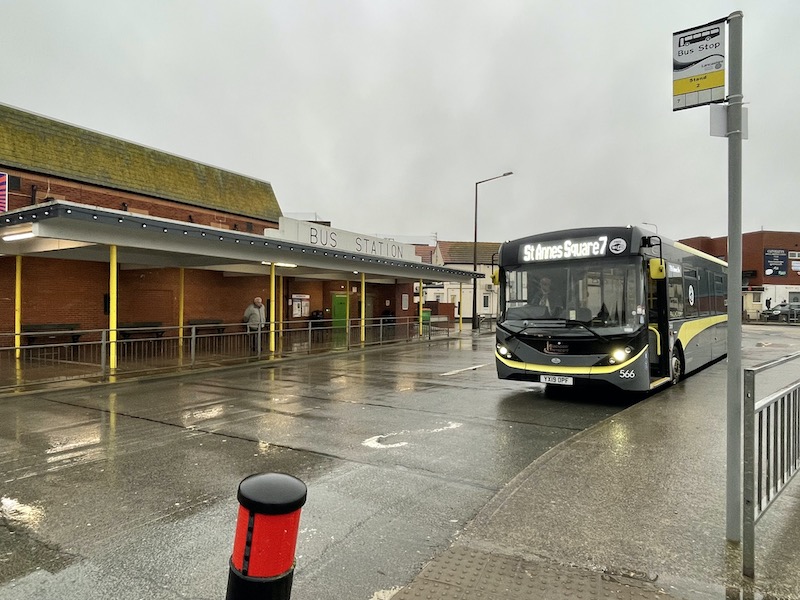
My travels took me to the rather traditional and old fashioned looking bus station at Cleveleys on the coast road to Fleetwood, which sees a variety of bus routes as well as the tram linking it to Blackpool, with routes 3, 4 and 7 crossing the town with the former two continuing to the shopping area (and a large Tesco) at Mereside and the latter to St Annes,

I found some of the journeys in the late morning and early afternoon fairly lightly loaded, which given the weather wasn’t surprising, but closer to school finishing time I was impressed with the numbers travelling including on a journey on route 6 from Mereside to Grange Park being used by parents collecting young children from a primary school which was encouraging to see.

I was told that normally the bus we were all on is a double deck but had a single deck that day.

Other routes were also getting noticeably busier as the afternoon continued.
Obviously you can’t visit Blackpool without a trip on the tram which runs along the seafront from Starr Gate to Fleetwood every 15 minutes (the Route Guide states ‘up to every 7 mins’).
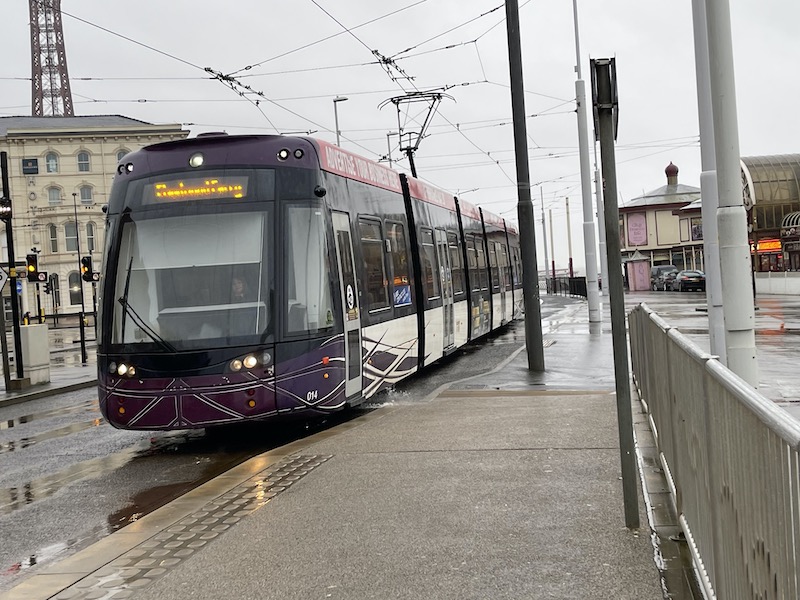
A cold, wet winter’s day in January isn’t the best weather for a tram ride and unsurprisingly there weren’t many other passenger, but I enjoyed it nonetheless.

I noticed the parallel route 1 which runs hourly wasn’t much busier either.

Heritage trams are also important and are brought out for special occasions as well as the hugely popular annual Autumn light display along the seafront.
Blackpool Transport’s website is easy to navigate and has the network map shown earlier and easy click links to timetables for each route including a map showing the location of each bus on that route in real time.
Municipal owned companies are renowned for their love of tradition and so it’s fitting to see the website still includes a fax number as an option to make contact.

There’s a page giving details of ticket prices (although the current £2 capped fare doesn’t get a mention) as well as details of Tap & Go, capping and contactless which the Company introduced last September.

The 1 hour ticket is an interesting option to buy either on bus or through an app or online which acts as a hopper fare, alebit more expensive than a one journey fare.
The £2 fare does get a mention on the monitors inside buses which scroll through various promotional messages as well as indicating how long the bus will be waiting at the stop to keep to the schedule. Indeed I found some of the running times quite generous, but that probably reflects the lack of traffic congestion and delays on a winter’s day.

Promotion of the £2 fare can also be found on the company’s social media channels with it taking pride of place as the header on Twitter.

It’s also good to see Twitter being used by staff based in the town (not all bus companies follow such a policy) with regular messages advising of any operational issues. These last few days has also seen messages promoting the company’s Recruitment Day held yesterday and today. And you get free travel to and from the event – worth turning up just for that!
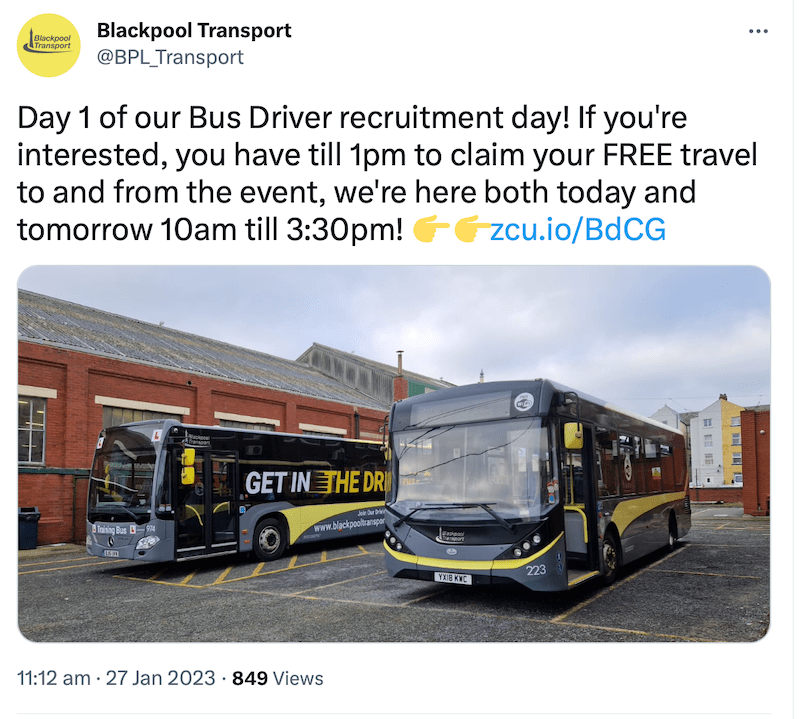
Blackpool Transport’s finances have obviously been stretched during the last couple of pandemic dominated years and the dependency on Government funding. The accounts for the pre-Covid year ended March 2020 show a profit before tax of £471,630 on a turnover of £23,812,671 giving a rather concerning and unimpressive profit margin as low as 1.75%. The loss before tax in the following years ended March 2021 was £713,847 and ended March 2022 was £357,121.
I’m sure the current year (ended March 2023) will show some improvement on those losses as the recovery from the Covid hiatus continues. But it’s not going to be easy. The electric buses may help, but Blackpool Transport epitimises the challenges facing the bus industry at this time which even impact Bus Operators of the Year.
Finally, I’m still puzzled about the Palladium branding. What does it mean? Maybe that’s the magic ingredient.
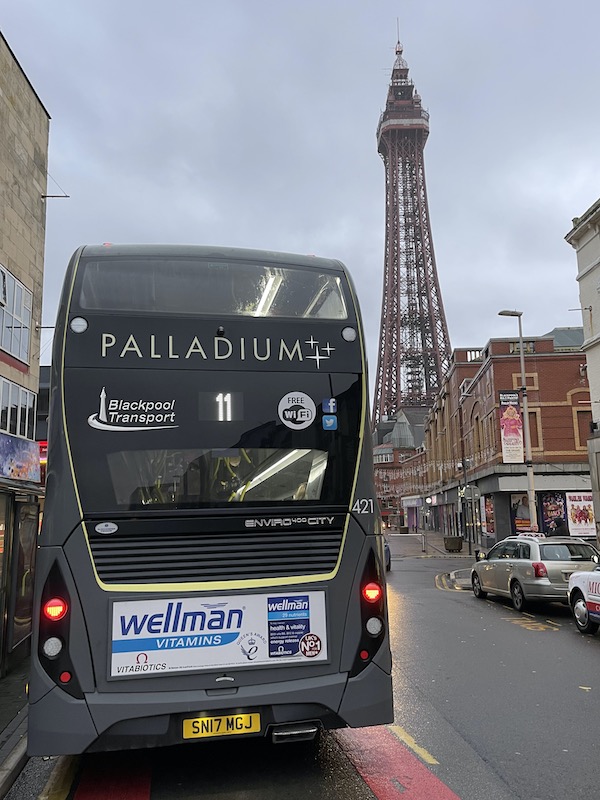
Roger French
Previous AtoZ blogs: Avanti West Coast
Blogging timetable: 06:00 TThS
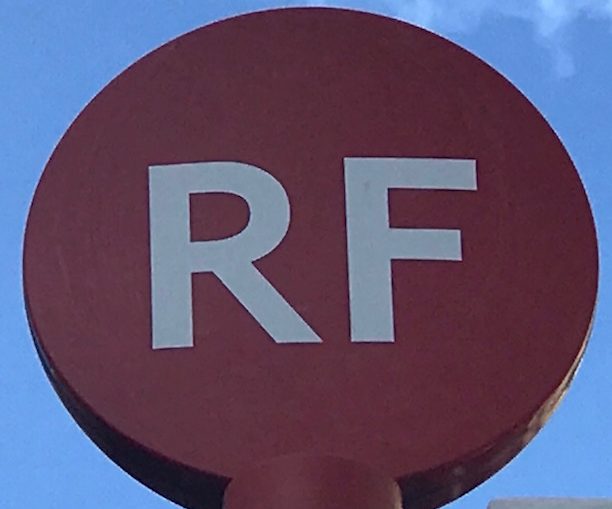

Not a great profit is it. Could be worse. They could have chucked a load of money at Best Impressions and multiple network redesigns and then made a multimillion pound loss like a fellow 10% member did at a once great company. Which has now resulted in multiple redundancies due to it needing to be completely rebuilt. Each to their own I suppose…..
LikeLiked by 1 person
No disrespect intended to the good folks at Blackpool Transport, but it’s a sad reflection on the industry where what seems like basic competence now makes you Operator of the Year. There is literally nothing here that every operator shouldn’t be doing (possibly excepting the age profile of the fleet). I know the commentary in Buses said that the field this year was very small since lots of operators didn’t feel they could or should enter.
LikeLiked by 1 person
What a damning indictment of the British bus industry that this is considered operator of the year material.
LikeLiked by 1 person
Another interesting article. I’m always intrigued by the bus maps, which look excellent when they’re produced. A lot, perhaps all or most, of them seem to be produced by a company called FWT. I don’t know anything about this company and the people who produce the maps there so perhaps I can be as bold to suggest a future article about them, if this would be possible.
LikeLiked by 2 people
FWT predate Best Impressions, as they used to produce the maps for London Country and some other National Bus Company subsidiaries. They seem to get on with providing a quality product without shouting about how wonderful they are and have a loyal clientele.
LikeLiked by 1 person
FWT went bust at some point in the 2010s. The name and some of the business was purchased by Pindar, which offered a very similar service.
Some former FWT staff – notably Doug Rose – set up FWT London to continue the same sort of work, although this does not appear to be a legal identity.
There’s no name on the Blackpool map, so it isn’t obvious who has produced it. There aren’t many companies in the sector – GRM Mapping is another one who sometimes crop up.
LikeLike
Looking at the Route map there seems to be a lot of duplication
As stated in the article the Tram and the 1 run parallel for almost the whole route only deviating in Fleetwood
Fleetwood also being served by the 14, 74 and 75.
It does look as if the network needs reviewing. Well unless there are massive numbers of bus users in Fleetwood which seems unlikely given its 30.000 population
As for frequencies it could be the tram is much more frequent in the summer which might account for the 7 minutes as they may have a summer and winter timetable
As for the branding it dull and meaningless. Palladium is a very expensive metal it is also in the name of a London theatre. What it has to do with Blackpool I have not a clue
If you think of Blackpool you thing of the tower and trams and not Palladium
LikeLike
Although I personally like the stylish, elegant bus livery (some other Companies please note!), but not sure why Blackpool Transport choose to paint the trams in an entirely different one!
Only yesterday, I enjoyed a lengthy and very comfortable fast-timed rural ride in an almost twenty year old Dennis Trident. The bus had clearly been well maintained, was warm with very comfortable moquette seating, and a pleasure to travel in. So why oh why do we have this obsession with “new” vehicles, a three year average age (I thought BT had actually opted for a 5-year age) both ridiculous and clearly unobtainable. All “new” and shiny vehicles become “old”, and surely if a vehicle is fit for purpose, age obsession can only damage the bottom line of a Company balance sheet.
LikeLiked by 1 person
There seems to be an expensive obsession with changes buses every few years. Why who knows. A modern bus should last 7 to 10 years
A modern Electric bus costs about £400,000 . It they swap them every 4 years that’s a £100,000 a year
Most will probably be sold on or cascaded but that’s still a high cost and many smaller operators will not be able to afford the charging facilities and in many cases the local grid and substation will not be up to it and would need to be upgraded
Given typical passenger numbers the economics seem to be hopeless without huge subsidies
Maintenance costs of electric buses will not be much less than a diesel bus
LikeLiked by 1 person
Why? Fashion. It’s what all of us, whether the consumer or the investment market (not least of all politicians, and enthusiasts) have been taught to expect.
Before we criticise, we should think. We’re all addicts, in one way or another, whatever we like to think.
LikeLiked by 1 person
Absolutely, my same thoughts. At the end of the day, a bus should turn up and run, adding to its reliability. Safeguard Coaches demonstrated that, with their 23 year old Optare Excels, age is just a number for buses – many kudos to their engineering team!
LikeLike
In my experience they are overwhelmed on the sea front and tram service every year during the illuminations, and despite providing a poor service particularly to the north shore hotels, the next year they’ve learned nothing and it’s the same again…
Taking all the heritage trams out of normal service during those exceptionally busy times hasn’t helped, as the new fleet simply can’t cope but there’s nothing much they can do about that now as there’s no more new trams and I guess no more money. Well they’ve lost my family business off the back of it and I’m sure I’m not the only family that now doesn’t go to a place that’s supposedly crying out to try to attract visitors!
LikeLiked by 1 person
After a recent visit to Blackpool just prior to operator winning the accolade, I found myself unable to reconcile the real-world experience with the platitudes dished out at the awards. Whilst the buses might be new, the interiors were dirty, with litter in abundance. However, it was the attitude of the staff which left the lasting impression, not one driver throughout the day offered any form of greeting or acknowledgement of my presence.
The realisation is the ‘Bus Operator of the Year’ awards are for the industry, by the industry and nothing is better than blowing your own trumpet.
LikeLiked by 1 person
Bus Operator of the Year has always been nothing more than industry back-slapping.
Few of the operators who win regularly are anything special on the ground; the self-proclaimed “really good bus company” TrentBarton won it for years and yet their offering was never really anything better than their neighbours – and when one of those neighbours is Arriva you know there’s nothing to shout about!
LikeLike
As someone who worked in Derby until recently, I couldn’t disagree more. TB have far higher standards on fleet preesntation, publicity and staff attitudes to customers than Arriva. While Derby isn’t Arriva at its rudderless worst (see various of Roger’s earlier posts) they hardly represent industry best practice.
LikeLiked by 1 person
I don’t know what A Nony Mouse’s issues with Trent/Barton are, but I once tried to buy some scratch off ZigZag+ tickets from the Trent/Barton Broad Marsh travel office (because I would have been starting trips from Leicester, and at the time you couldn’t buy ZigZag+ tickets on Skylink from Leicester even though they were valid) and was flat refused the purchase of undated tickets “because they might be used fraudulently”.
The whole point of scratch-off tickets is that you date them when you want to use them, but the manager flat refused to sell them unless they were dated before sale and also flat refused to come out of his or her office to speak to me, sending messages through the poor lass who was working on the desk and who was expected to deal with unhappy customers while the manager hid.
That’s not what I call award-winning service.
LikeLiked by 1 person
The ‘Up to every …’ frequency claim is one of my pet hates. I wonder if anyone has evaluated if it generates any extra custom at all. You still have to look up in a timetable to see if you can get where you want to go at the time you want.
Now wouldn’t it be wonderful if the company could just say ‘every 7/8 minutes from 8am to 8pm’? – and actually provide that service. But I guess that’s too innovative and customer-friendly! (not actually very innovative – the London underground has been doing it for at least a century)
You say that the tram will be easier for travel between the station and the sea front. Why is it ‘a bit confusing working out which bus and from where to catch it’ – if the bus industry could devote its collective intelligence to sorting out that one, it would be such an easy win – all over the country! My suggestion – a single stop for all services making that trip, with a ‘tram-style’ shelter with a LARGE-PRINT list of the times all the buses leave there.
LikeLiked by 1 person
Hey, I can solve the “where does my bus go from” conundrum!
….How about a central place, under cover, fairly near the station where all the terminating and other bus routes to and through the town all go…What a brilliant idea!
…And I’ve found a great spot for one of these places too… just down from the road from the north station where the gym is!
LikeLiked by 1 person
If it’s “up to every X minutes” then surely this implies that buses may be more frequent than that for one who takes this statement literally. Perhaps we should be saying “down to every X minutes” but this gives off a bit of pessimism, with the general feeling of being awaited at the bus stop for ages.
LikeLike
I think the reason for the bus service 1 duplicating the tramway is because it carers for non resident concessionary travel that the trams do not.
I last visited Blackpool in the days before the tramway modernisation. Back then the bus network was called “Metro Coastlines,” which I thought was a rather catchy name. This was Blackpool being an early adopter of route branding. There were many Metroriders operating during my visit.
Regarding the comment about non communicative drivers, this is inexcusable. Where is it socially acceptable to ignore somone when they speak to you? First West of England drivers in my locality exhibited this ignorant behaviour, in stark contrast to the friendly Faresaver staff. Thankfully Worst threw in the towel eventually leaving my route to the professionals.
LikeLiked by 1 person
I dunno. At least in the big groups (though by no means limited to them, in my experience) , I suspect the drivers are often as, if not more, confused than the passengers.
Which is the worst answer to “what’s going on?”, silence or the honest answer if it’s “I haven’t got a clue either”? The alternative may be even worse to contemplate.
LikeLike
Regarding the passenger loadings, in a recent edition of Buses Magazine, it said Blackpool has recovered to pre pandemic passenger numbers and some growth beyond that.
LikeLiked by 1 person
Impressive passenger growth reported in BUSES, very surprising given that driver shortage means that frequencies are well below pre COVID.
More passengers travelling on fewer buses a winning formula!!.
LikeLiked by 1 person
Is that so unusual?
More buses without an (often disproportionate) increase in resources (for whatever reason, not least congestion as well as COVID ) = less reliability = a disproportionate reduction in passengers then
less buses = greater reliability, with a disproportionate increase in passengers. Nothing unusual or unexpected, surely, in the real world?
LikeLiked by 1 person
Something does not seem to add up. I will need to crawl through the accounts to see if I can make sense of it
If the claim is correct that passenger numbers have recovered, How is there a £4M odd loss if you take out the government grant ?
LikeLike
Perhaps there was a higher proportion of paying passengers before Covid.
It’s not just about the numbers of bums on seats; it’s about how much they pay (or how much is paid for them, in the case of concessionary passholders).
LikeLike
Palladium is a precious metal (aping Gold/Platinum etc) and also a local reference:
https://database.theatrestrust.org.uk/resources/theatres/show/2476-palladium
It was a very common name for theatres, ballrooms and the likes, it’s not a London thing.
LikeLike
“I think the reason for the bus service 1 duplicating the tramway is because it carers for non resident concessionary travel that the trams do not.”
I think it’s just conservatism. The old tramway lacked capacity so it was very much needed particularly at busy times of year. And municipals don’t like rocking the boat.
I think it should be binned now, and the fares fully integrated (the day tickets and longer are, but the singles should be too).
LikeLiked by 1 person
Great to see a 24 hour ticket here in the UK; is it the only one? Commonplace on mainland Europe and probably worldwide. I do begrudge buying a day ticket in the afternoon and feeling like I’ve not got my money’s worth. Can imagine many a weekend visitor rocking up say 6pm on a Friday, hopping on bus or tram to their hotel and still having almost a whole service day the next day to make use of the ticket. Just one less bit of friction for the visitor to grapple with. Well done!
LikeLiked by 1 person